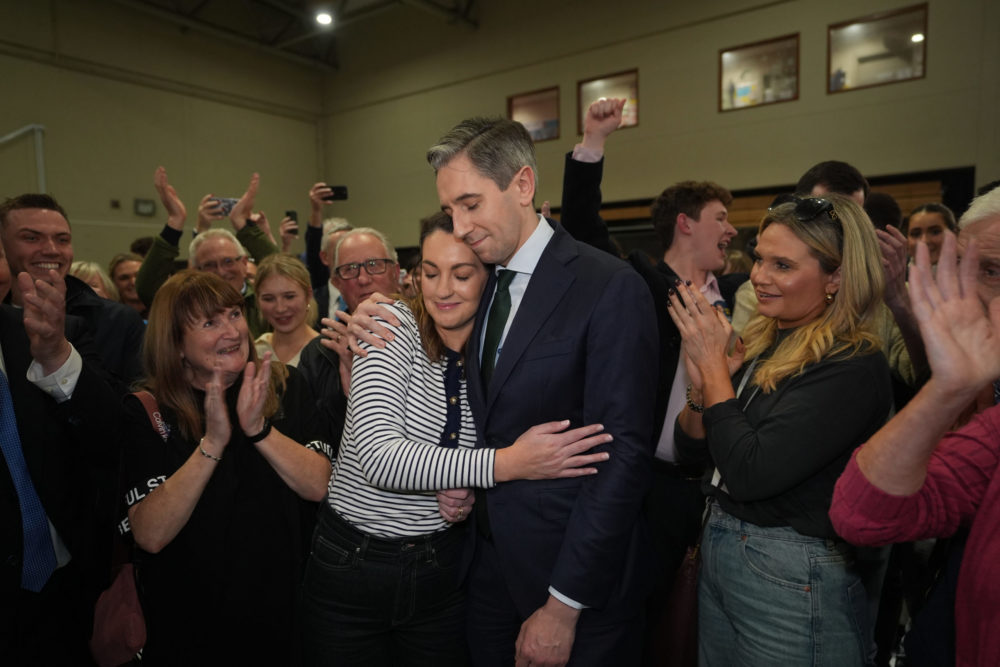Counting to resume in Irish election as focus shifts to coalition permutations

Counting will resume today in the Irish General Election as focus intensifies on the potential make-up of the next coalition government.
All of the three main parties – Fianna Fail, Fine Gael and Sinn Fein – were bullish about their prospects as the first results started to come through on Saturday.
However, early indications from count centres across the country suggest the return of an administration involving Fianna Fail and Fine Gael currently looks more likely than a government including Sinn Fein.
The two parties that have dominated Irish politics for a century, and who shared power in the last coalition, both ruled out governing with Sinn Fein prior to Friday’s election, so it would seem unlikely that either would countenance that option if they could form a workable coalition without the need for a dramatic U-turn in stance.
Fianna Fail appeared confident late on Saturday of emerging as the largest party.
Smaller parties
If it does, leader and current deputy premier Micheal Martin would then move to begin what could prove to be a protracted process of negotiating an agreed programme for government with would-be coalition partners.
If Fianna Fail and Fine Gael do return to power, they will undoubted need one, if not two, of the Dail parliament’s smaller parties to reach the required 88 seats to form a majority.
The Social Democrats and the Irish Labour Party appear the most realistic junior partners.
The Green Party, which was the third plank of the last coalition, is set for a bruising set of results, with leader Roderic O’Gorman among a series of party representatives in a fight to hold onto their seats.
After he was re-elected as a TD on Saturday night, Mr Martin said it “remains to be seen” whether he will return to the role of Taoiseach – a position he held between 2020 and 2022 – but he expressed confidence his party was well placed to make gains.
Current Taoiseach, Fine Gael leader Simon Harris, dismissed talk of a Sinn Fein surge and said he was “cautiously optimistic” about where his party will stand after all the votes are counted.
He was also elected as a poll topper in his constituency on Saturday evening, as was Sinn Fein president Mary Lou McDonald.
Ms McDonald expressed determination to form a government of the left as she insisted Sinn Fein had broken the state’s two-party duopoly.
Proportional representation
The counting process could last days because of Ireland’s complex system of proportional representation with a single transferable vote (PR-STV), where candidates are ranked by preference.
Away from the machinations of government formation, there is also significant focus on independent candidate Gerard Hutch who, on Saturday evening, was sitting in fourth place in Ms McDonald’s four-seat constituency of Dublin Central.
Last spring, Mr Hutch was found not guilty by the non-jury Special Criminal Court of the murder of David Byrne, in one of the first deadly attacks of the Hutch-Kinahan gangland feud.
Mr Byrne, 33, died after being shot six times at a crowded boxing weigh-in event at the Regency Hotel in February 2016.
A Special Criminal Court judge described Mr Hutch, 61, as the patriarchal figurehead of the Hutch criminal organisation and said he had engaged in “serious criminal conduct”.
The Social Democrats have a strong chance of emerging as the largest of the smaller parties.
The party’s leader, Holly Cairns, was already celebrating before a single vote was counted however, having announced the birth of her baby girl on polling day.
Support our Nation today
For the price of a cup of coffee a month you can help us create an independent, not-for-profit, national news service for the people of Wales, by the people of Wales.





The main interest is in the destuction of the Green Party. They went from 12 elected politicians and part of Government to a maximum of one elected politician if they are lucky. Again, a rejection of the green, destroy the economy, blobs.
Minority coalition parties often suffer in elections. The Lib Dems slumped after their coalition with the Tories in the UK Parliament.
In this case why vote Green if all you get is a right wing FF/FG government?
Appears to be true – the small Irish Labour party agreed to back a previous Irish coalition government, and subsequently suffered voter hostility the next time the nation voted.
But it doesn’t necessarily last: early results suggest that Irish Labour has recovered its ground in this last Dail election.